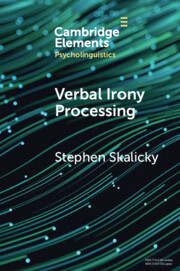Verbal irony processing
Ironic language is a salient reminder that speakers of all languages do not always mean what they say. While ironic language has captured the attention of theorists and scholars for centuries, it is only since the 1980s that psycholinguistic methods have been employed to investigate how readers and hearers detect, process, and comprehend ironic language. This Element reviews the foundational definitions, theories, and psycholinguistic models of ironic language, covering key questions such as the distinction between literal and ironic meaning, the role of contextual information during irony processing, and the cognitive mechanisms involved. These key questions continue to motivate new studies and methodological innovations, providing ample opportunity for future researchers who wish to continue exploring how ironic language is processed and understood.
zum Buch im KatalogPlus
zum Buch auf der Verlags-Website
The Deep: A Companion
 What’s in the Deep?
What’s in the Deep?
This companion explores the myths and legends of merfolk and sea monsters to navigate our transcultural pasts and environmental presents and explain our endless fascination with the sea. More than any other time in human history, our relationship to the oceans and the creatures of the Deep has come into focus, not just as an environment to be explored, exploited and, more recently, poisoned, but as source of both our deepest anxieties and possible futures.
In 31 original essays by experts in their respective fields, the Deep is brought to life, from representations of mythological sea creatures to present-day visions of the blue environment. As our place in the world and our effects upon it become increasingly contentious, The Deep offers ways in which we might re-experience and realign ourselves to the watery world that covers the majority of the earth’s surface and become part of a shared, more ecological, future.
zum Buch im KatalogPlus
zum Buch auf der Verlags-Website
